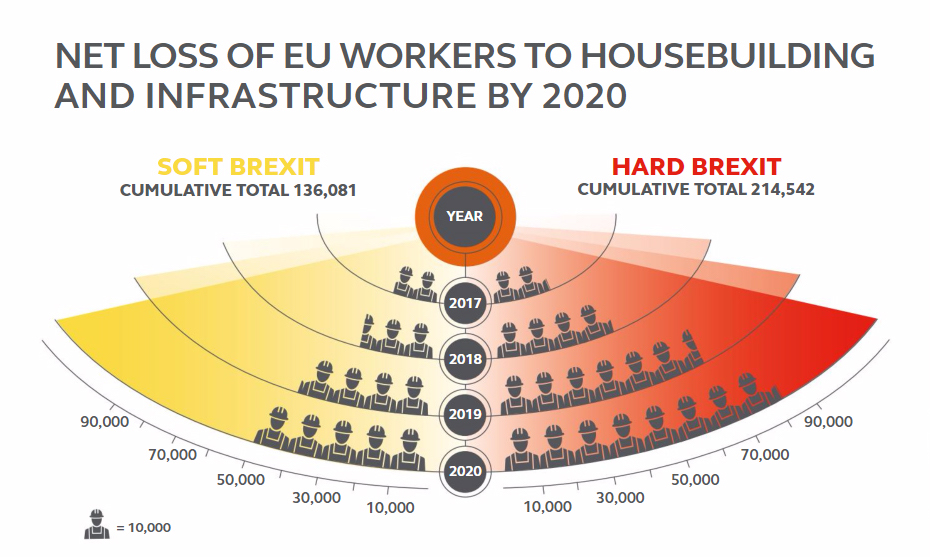Sadiq Khan, the mayor of London, has warned that the capital’s construction market may be “crippled” if the UK opts for a version of Brexit that puts the employment status of EU nationals in question.
The mayor was speaking at the launch of a report that shows that 95,000 of London’s construction workers – more than a quarter of the total – have EU nationality.
He said: “While we are working to train up more Londoners to have the skills to work in construction, you can’t escape the fact that a ‘hard Brexit’ could leave a quarter of the skilled construction workforce in the capital high and dry, which would have a crippling effect on our plans to build the homes Londoners so desperately need.”
The UK government has refused to guarantee the status of EU nationals before exit negotiations begin later this year. The question is likely to be one of the main bargaining chips – along with the status of UK nationals in the EU.
The report, titled Housing in London, says there are 350,000 people working in London’s construction sector, of which just over half are from the UK. Some 27% are from the EU, 14% are from outside Europe and 3% are from European countries outside the EU.
The potential loss of skilled workers would be good news for those who remain, and may in time stimulate greater investment in training, but it would be bad news for construction and property companies who have come to rely on the European labour pool to keep labour costs down. It would also make it even harder to keep pace with demand for housing in the capital.

Arcadis’ graphic shows effect of hard Brexit over four years
A report by Dutch engineer Arcadis, released last week, found that the industry as a whole, which is already suffering the effects of years of underinvestment in training, may lose as many as 210,000 workers in the event of a hard Brexit.
Simon Light, Arcadis UK’s client development director, notes in the report: “Even before Britain voted to exit the EU, the number of people in the UK properly equipped to deliver the nation’s lofty modernisation plans was well below requisite levels.
“Official figures show that construction employment is 15% down on 2008, with large numbers of workers in their fifties leaving the industry.”
The report adds that neither prefabrication nor training will be able to respond to the crisis quickly enough to maintain output, and that “rapid plugging” is needed to alleviate the labour shortage – meaning access to migrant labour.
The mayor’s report says London needs “an extra 13,000 workers each year until 2021 to plug the skills gap … highlighting just how important it is for London to be able to continue to attract the talent it needs post-Brexit”.
Top image: London needs to recruit 13,000 extra workers a year (engineerhu.co.uk)
Further Reading:
Comments
Comments are closed.











If Labour costs go up, making projects more expensive, then land costs will have to go down (or not increase as fast).
I am not sure where the notion that once we leave the EU all the EU workers will be immediately banned or repatriated comes from. The fact that the construction industry has become and will for some considerable time remain reliant upon immigrant labour is not something that will come as a shock to anyone connected with the brokering of the exit arrangements. What does encourage me though is that despite the warnings of impending Armaggedon when we leave the EU so many of the EU non British residents of the U.K. are desperately keen to stay, these remainers I can applaud and as long as they are making a contribution to the improvement of life for all in the UK they are welcome to stay.
An under qualified workforce is not new it is a very old neglected problem
I’m not sure what the pro EU remainers don’t understand about the exit process.
It wont be the British government who determine what type of “Brexit” we have, it will be the other EU countries.
Britain will be leaving the EU, so stop undermining the government and let them try for the best deal without being hindered by ‘bleating’ about anything and everything
Sounds like a great opportunity to invest in skilled trades training for the unemployed.